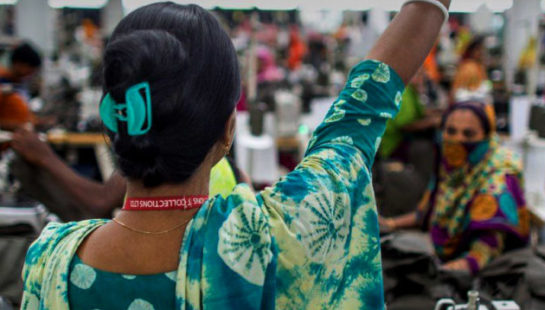Have you ever had those alarm bells go off in your head as you watch a loved one throw a recyclable into the rubbish bin? Or when they ask for a plastic bag at the checkout? Maybe you’ve bitten your tongue over their excitement about a purchase from a fashion brand with poor ethical standards?
As someone who spends her days researching and writing about ethical consumption, I hear those bells often. And I’m not always brave enough to act on them.
The thing is, we’re all guilty of making the occasional easy choice. Too many strongly worded sentences can send you into exile, whereas ignoring the issue achieves nothing for the cause – often leaving you even more riled up than you were to begin with.
Trust me, I’ve been there. Too many times. But having conversations is like using a muscle. The more you use it, the stronger you become.
So, how do you help someone care more about the issues you know are important? Whether it’s on the topic of ethical fashion, reusable coffee cups, or sorting the recycling, here’s a shortlist of tips to help those tricky conversations with friends bloom into action. (Without them ever having to tell you to get off your high horse!)
1. Leave Your Soapbox At Home
It’s important to acknowledge that everyone has a different capacity to engage with these issues. Each person’s individual circumstances will determine how much time and energy they can devote. Remember, there’s a level of privilege in having space and resource to dedicate to being an ethical shopper; often people facing ongoing life stressors do not have the same luxury. And every meaningful conversation we engage in is another opportunity to demonstrate our understanding and compassion.
2. Don’t Play The Guilt Card
Making someone feel bad is never a strong catalyst for change. You’ll have more fruitful conversations if you approach them from a positive, rather than negative, point of view. Instead of talking about how your friends’ clothes were made by exploited workers (which can be an important discussion, in the right time and place), talk about the cool new brand you’ve found that champions dignity and autonomy for garment workers. Yes, the current system of production and consumption is broken. But remember, the broken system is the problem, not the individual consumer. Let your friends know that they can use the resources they have available to them to contribute towards a better world for all.
3. Meet Them Where They Are
Shopaholic or minimalist, ethical expert or sustainability newbie – we’re all at different stages on the journey towards becoming more ethical consumers.
Instead of making assumptions, approach the conversation openly. Ask your friend for their thoughts on the topic and gauge what they already know. Stop talking and listen. What are the challenges or barriers they face in ethical shopping? What’s driving their purchases or actions? This will be different for everyone, so listen attentively and steer the conversation accordingly. Whilst you may have changed your purchasing habits because of your passion for worker rights, your friends may be more interested in environmental issues of equal importance. Empathy and patience will get you a long way!
4. Make It Personal
One of the most powerful tools you can use is sharing your own journey and experience. What is your why? Everyone’s catalyst is different – and that makes for a great conversation starter! For me, my experience working in the fashion industry opened my eyes to behind-the-scenes practices which still haunt me today. I was ethically challenged spending my days contributing towards this system, and this motivated a shift in my own personal consumption habits which grew over time to encompass issues much broader than fashion. How has your behaviour shift affected your own life? What did you find most difficult about the process, and what made it easier? Be relatable, be honest, and talk about your struggles.
5. Know Your Facts, But Don’t Preach Them
It’s great to have some key stats in mind to support your position and ground your conversation in truth. But don’t use them to induce guilt. Instead, use your facts to help friends make a connection between an abstract global issue and the lived experience of real people. For example, if you’re talking about living wages, you might say ‘Imagine what it’s like to work for more than 60-hours a week for a wage that can’t cover your basic needs’. In Australia, we experience great privilege. When we’re aware of this privilege, it enables us to respond from a place of thankfulness and gratitude.
6. Provide A How
Consuming ethically is not always easy. There are a myriad of complex issues to consider, which can be overwhelming when you start unraveling them. In addition to the why, you need to provide a how. Empower your friends with tangible steps they can take to make a change, but remember, this will depend on what stage your friend is in in their ethical shopping journey. Encourage your friend to pick one or two issues they’re passionate about and read up on them. Then encourage them to factor their new knowledge into their purchasing decisions or daily actions. Share the resources that have helped you – do you have a favourite book or podcast that unpacks the issues with practical actions? Have you used the Ethical Fashion Guide or other shopping tools? Give them something that allows them to digest information in their own time, and on their own terms.
7. It’s Not A One-Time Conversation
Learning about ethical shopping is an ongoing dialogue. You can’t have a single chat and expect immediate change – we’re all on a journey towards understanding justice. Rather, it’s about enabling your friends to familiarise themselves with the topic and understand its importance more deeply over time. Whether you’re out shopping together, talking about global issues, or having a mundane water-cooler conversation, we can all plant regular seeds which grow over time.
8. You Don’t Have To Know All The Answers
Be humble and accept that we’re all on this journey together – none of us get it right every time. Small, imperfect actions made by millions of people have a much stronger impact than a handful of individuals taking perfect steps.
So, next time you hear those alarm bells, try using some of the tips above. When we raise our voices and work together, we can help achieve a better world for all, one that God intends.



 Baptist World Aid
Baptist World Aid

 Ally Turner
Ally Turner